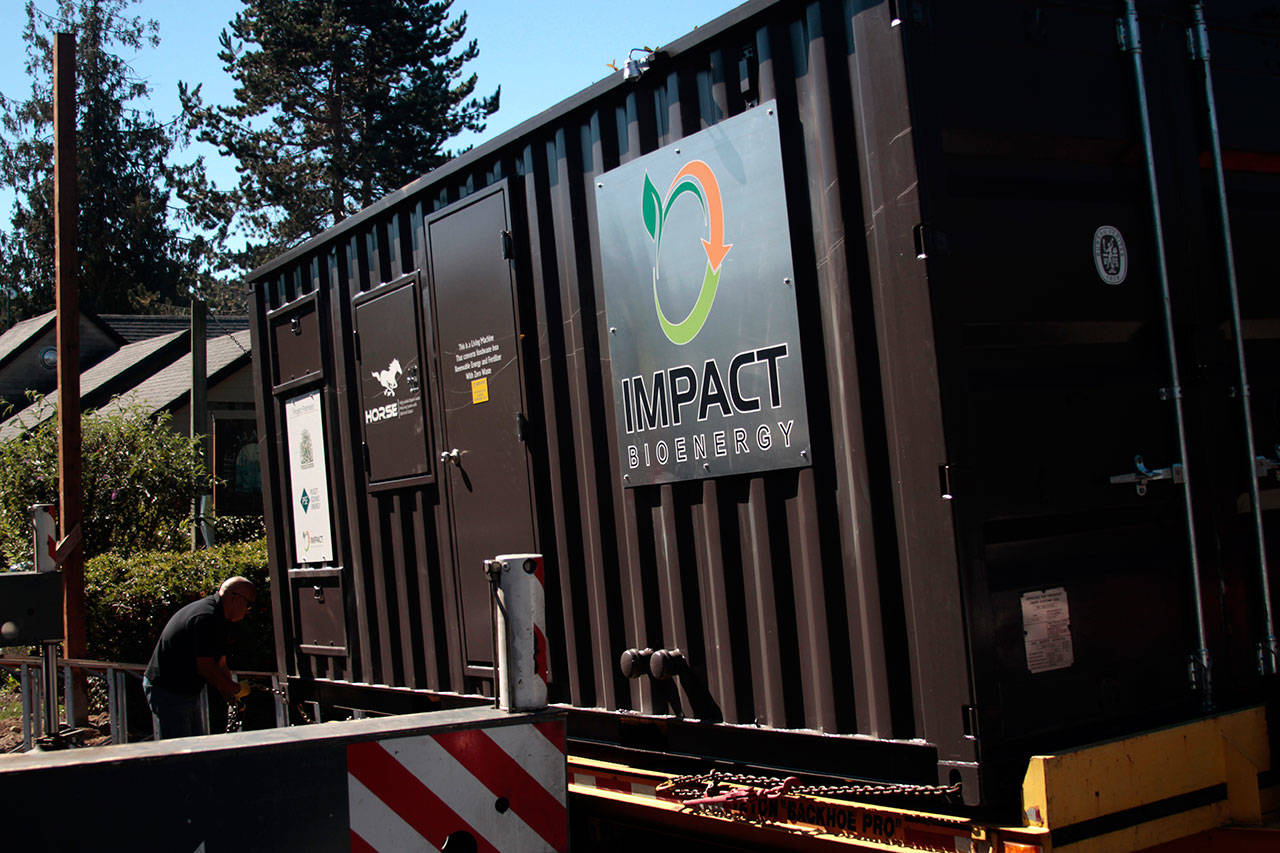The HORSE that has lived in the small yard adjacent to the Harbour Public House in downtown Winslow since late last year is looking for a new home.
Be warned. It has quite an appetite.
But, of course, that’s kind of the appeal.
The tenure of the 13,000-pound High solids Organic waste Recycling System with Electrical output (HORSE) at the pub, part of a pilot program, a partnership between Puget Sound Energy, Seattle-based Impact Bioenergy and Jeff Waite, owner of the Harbour Public House and Pegasus Coffee, recently came to an end.
The purpose of unit’s stay was to demonstrate the viability of using food waste to make electricity and fertilizer and to further the discussion about a permanent, larger community digester.
Mission accomplished, PSE officials said, and they are now funding a second study to determine the viability of a larger, permanent community digester, and are in search of a new partner on the island to host the HORSE for the upcoming year.
The deadline to find a new 12-month host for the HORSE system is Sept. 30, according to PSE officials.
The HORSE was a welcome addition in its first home, the owner of Harbour Public House said.
“The ‘feeding’ of the HORSE motivated our staff to look for additional ways of repurposing our waste streams,” Waite said. “Based on the positive feedback we are experiencing, we think it’s time for a community-wide discussion on how the island can move on more community-based installations.”
The digester is designed to generate 2,550 kilowatt hours of energy per year, according to PSE. The system’s technology can generate the energy equivalent of one barrel of crude oil from 2,900 pounds of food scraps. It also generates 5,400 gallons per year of nutrient-rich fertilizer, which has so-far been supplied to local farms. It is a zero-waste system, which also avoids the need to truck organics off the island.
The HORSE pilot project is an extension of PSE’s ongoing interest in developing alternative sources of renewable energy, company officials said.
In 2004, PSE began partnering with dairy digesters as part of the Green Power Program. Those digesters turn manure into methane used to fuel an electric generator.
PSE’s Green Power Program has been recognized by the U.S. Department of Energy and the Environmental Protection Agency (EPA) as a leader in renewable energy development, according to PSE. The Bainbridge Island initiative is intended to move that focus and expand the program to urban environments.
“PSE knows how important renewable energy is to Bainbridge Island residents,” said Karen Brubeck, PSE outreach manager. “The commitment is evident through our programs like Green Power, where currently 1,175 Bainbridge Island residents and businesses participate and contribute 12.5 million kilowatt hours of renewable energy to the grid each year. Bainbridge has the second highest participation rate in the Green Power program in our entire service territory, and PSE has taken notice.”
The island-based program had thus far exceeded expectations in terms of both its effectiveness and the community support it received, Brubeck said.
“We want to thank Jeff Waite at Harbour Public House for being an innovator and taking on this pilot project,” she said. “It is PSE’s goal to keep the HORSE pilot project on the island to continue the experience. In the meantime, we thank Bainbridge Disposal for offering space to stable the HORSE as PSE looks for a another host once it leaves the Harbour Public House Aug. 1.”



